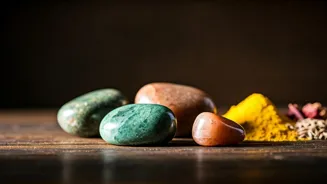Ayurveda and Stones
Ayurveda views kidney stones through the lens of imbalances within the body's doshas, primarily Vata and Kapha. The Ayurvedic system explains that an excess
of these doshas can lead to the formation of stones. Vata, associated with movement and dryness, can cause dehydration, concentrating the urine and making it easier for crystals to form. Kapha, responsible for structure and cohesion, when imbalanced, can contribute to the clumping of these crystals. The aim of Ayurvedic treatment is to restore balance. Treatments focus on eliminating the stones and preventing future formations by supporting the natural functions of the kidneys. Therefore, the individual's unique constitution (Prakriti) is carefully evaluated, and a personalized approach is adopted. This ensures that the treatment is tailored to the specific imbalances and conditions of the person, offering a holistic approach to the patient's overall well-being, not just the symptoms.
Ayurvedic Treatments Explained
Ayurvedic treatment for kidney stones includes a combination of herbal remedies, dietary changes, and lifestyle adjustments. Herbal formulations, like Punarnava, Varuna, and Gokshura, are commonly used. Punarnava is used to promote kidney function and reduce swelling. Varuna helps to break down the stones. Gokshura acts as a diuretic and aids in stone removal. These herbs often come in the form of decoctions, powders, or tablets and are selected based on the individual's constitution. Panchakarma therapy, a detoxification process, may also be implemented. It includes therapies such as Basti (enemas) that can help eliminate accumulated toxins and support kidney function. Each of these treatments aims to cleanse the body, reduce inflammation, and assist in the natural elimination of the stones.
Dietary Guidelines: What to Eat?
Diet plays a crucial role in preventing and treating kidney stones within the Ayurvedic framework. A diet that balances Vata and Kapha doshas is often recommended. This generally means avoiding foods that are excessively dry, cold, or heavy. Hydration is essential; drinking adequate water is crucial to flush out the kidneys and prevent stone formation. Avoiding foods that are high in oxalates, such as spinach, rhubarb, and chocolate, can be beneficial. It's also advised to reduce intake of processed foods, refined sugars, and excessive salt. Incorporating fresh, whole foods is encouraged, focusing on easily digestible options, such as cooked vegetables, and fresh fruits with diuretic properties like watermelon and cucumber. Each person's diet is customized according to their body type and the nature of their kidney stones, maximizing efficacy.
Lifestyle Recommendations
Along with diet and herbs, certain lifestyle modifications support kidney health. Regular exercise and avoiding a sedentary lifestyle are beneficial. Exercise helps with overall health. Practicing yoga, specifically poses that stimulate the kidneys, can be incorporated. Abhyanga, or self-massage with warm oils, can also support overall well-being. Rest is important; adequate sleep is vital for the body's repair and detoxification processes. Stress management through practices like meditation and deep breathing exercises can prevent stress-related imbalances. Avoiding the suppression of natural urges, such as the urge to urinate, is also crucial. The integration of these lifestyle modifications with herbal treatments helps to create a comprehensive approach toward kidney stone management.





















